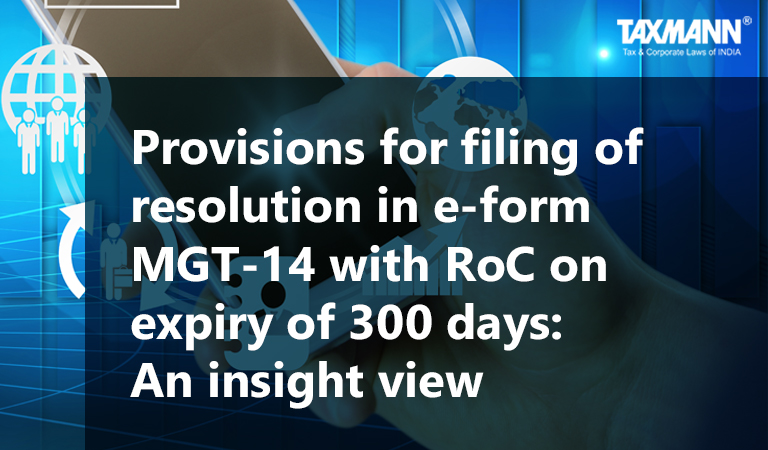Provisions for filing of resolution in e-form MGT-14 with RoC on expiry of 300 days: An insight view
- Blog|News|Company Law|
- 3 Min Read
- By Taxmann
- |
- Last Updated on 20 September, 2021

[2021] 130 taxmann.com 271 (Article)
As per the framework of Companies Act 2013, a copy of every resolution/agreement in respect of specified matters is required to be filed with the Registrar of Companies (ROC) within thirty (30) days from the date of passing of the resolution by making the payment of applicable fees. In case, the form could not be filed within a period of 30 days, the same can be filed within another period of 270 days, beyond the period of thirty (30) days (i.e.in all 300 days) by making the payment of additional fees as prescribed under section 403 of the Companies Act 2013.
Provisions of Companies Act 2013
2. Sub-section 1 of Section 117 of the Companies Act 2013, carries the provisions to this effect in its subsection (1) relating to “Resolutions and agreements to be filed” states that a copy of every resolution or any agreement, in respect of matters specified in sub-section (3) together with the explanatory statement under section 102 of the Companies Act 2013, if any, annexed to the notice calling the meeting in which the resolution is proposed, shall be filed with the Registrar of Companies within thirty days of the passing or making thereof in such manner and with such fees as may be prescribed within the time specified under section 403.
Sub-section (3)–applicability of section 117
3. This sub-section spells out that provisions for filing of resolutions/agreements would be applicable in the following cases:—
a. Special resolutions.
b. Resolutions which have been agreed to by all the members of a company, but which, if not so agreed to, would not have been effective for their purpose unless they had been passed as special resolutions.
c. Any resolution of the board of directors of a company or agreement executed by a company, relating to the appointment, re-appointment or renewal of the appointment, or variation of the terms of appointment, of a managing director.
d. Resolutions or agreements which have been agreed to by any class of members but which, if not so agreed to, would not have been effective for their purpose unless they had been passed by a specified majority or otherwise in some particular manner; and all resolutions or agreements which effectively bind such class of members though not agreed to by all those members.
e. Resolutions passed by a company according to consent to the exercise by its board of directors of any of the powers under clause (a) and clause (c) of sub-section(1) of section 180 of the Companies Act 2013.
f. Resolutions requiring a company to be wound up voluntarily passed in pursuance of section 304 of the Companies Act 2013
g. Resolutions passed in pursuance of sub-section (3) of section 179 of the Companies Act 2013 and
h. Any other resolution or agreement as may be prescribed and placed in the public domain.
Sub-section (2) of section 117 of the Companies Act 2013
Penal provisions for non-compliance
4. The sub-section (2) of section 117 of the Companies Act 2013 provides that if a company fails to file the resolution or the agreement under subsection (1) before the expiry of the period specified under section 403 of the Companies Act 2013 with an additional fee, then
– The company shall be punishable with a fine which shall not be less than five lakh rupees but which may extend to twenty-five lakh rupees and
– Every officer of the company who is in default, including the liquidator of the company, if any, shall be punishable with a fine which shall not be less than one lakh rupees but which may extend to five lakh rupees.
Click Here to Read the Article
Disclaimer: The content/information published on the website is only for general information of the user and shall not be construed as legal advice. While the Taxmann has exercised reasonable efforts to ensure the veracity of information/content published, Taxmann shall be under no liability in any manner whatsoever for incorrect information, if any.

Taxmann Publications has a dedicated in-house Research & Editorial Team. This team consists of a team of Chartered Accountants, Company Secretaries, and Lawyers. This team works under the guidance and supervision of editor-in-chief Mr Rakesh Bhargava.
The Research and Editorial Team is responsible for developing reliable and accurate content for the readers. The team follows the six-sigma approach to achieve the benchmark of zero error in its publications and research platforms. The team ensures that the following publication guidelines are thoroughly followed while developing the content:
- The statutory material is obtained only from the authorized and reliable sources
- All the latest developments in the judicial and legislative fields are covered
- Prepare the analytical write-ups on current, controversial, and important issues to help the readers to understand the concept and its implications
- Every content published by Taxmann is complete, accurate and lucid
- All evidence-based statements are supported with proper reference to Section, Circular No., Notification No. or citations
- The golden rules of grammar, style and consistency are thoroughly followed
- Font and size that’s easy to read and remain consistent across all imprint and digital publications are applied



 CA | CS | CMA
CA | CS | CMA
